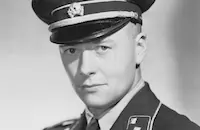Red River Robin Hood

Brief Synopsis
Cast & Crew
Lesley Selander
Tim Holt
Cliff "ukulele Ike" Edwards
Barbara Moffett
Eddie Dew
Otto Hoffman
Film Details
Technical Specs

Synopsis
As Jim Carey and his sidekick Ike ride toward the town of Red River to join their partner, Chet Andrews, on his ranch, a judge informs the local ranchers that a Spanish land grant deeds all the lands of the Red River district to Scott Yager. When Yager, who has bribed the judge to rule in his favor, offers to allow the ranchers to stay in exchange for rent, Chet protests and is arrested for his defiance. Sam Sterling, the editor of the town newspaper, openly doubts the authenticity of the document and vows to seek a retrial for the ranchers. As Jim and Ike near the town, they are met by an exodus of ranchers and learn of Yager's grant. In town, Jim goes to the newspaper office, where he introduces himself to Sterling and his daughter Carol. When Yager orders his men to destroy the newspaper office because of the editorials that Sterling has been printing, Ike and Jim defend the Sterlings, and in the ensuing mêlée, the sheriff loses his badge. Pinning on the badge, Jim poses as a lawman and orders Chet released from jail into his custody. After Chet advocates stalling Yager until Sterling can overturn the court's decision, Jim and Ike decide to work undercover to help Sterling. Pretending that Chet has double-crossed them, they return him to jail and accept a job collecting rents for Yager. That night, Jim, dressed as a masked rider named "Mr. Justice," urges the ranchers to stay and fight. Following Jim's instructions, Sterling assembles the ranchers and proposes pooling their resources to pay for one month's rent, during which time the editor will try to secure a retrial. While posing as Mr. Justice, Jim robs Yager's tax collectors with Ike and returns the money to the ranchers. In the interest of maintaining their ruse, Jim and Ike pretend to be robbed, too. When Sterling asks to see the land grant document to determine its authenticity by checking the paper on which it is printed, Jim tricks Yager into unlocking his office safe and then, posing as Mr. Justice, knocks him unconscious so Sterling can examine the paper. Carol then ties up Jim and Ike, who dabs his head with red ink to appear injured, so that Yager will believe that they, too, were victims of Mr. Justice. After regaining consciousness, Yager goes to Sterling's office to threaten him, but Jim and Ike shoot out the lights and send Carol and Sterling to secure enough signatures on a petition to reopen the trial. When Yager discovers the masked rider's cape in the newspaper office, he decides to have his own men pose as Mr. Justice and rob the ranchers, thus angering them so they will refuse to sign the petition. After one of Yager's men accuses Ike of lying about his injuries, Yager orders them taken prisoner. Meanwhile, Carol rallies the angry ranchers to catch the fake Mr. Justice. At Yager's headquarters, Ike and Jim escape their bonds and begin to shoot it out with Yager's men. Soon after, Carol leads the ranchers to the rescue, and after Jim apprehends Yager, the ranchers are granted ownership of their lands and all ends happily.

Director
Lesley Selander
Cast

Tim Holt

Cliff "ukulele Ike" Edwards
Barbara Moffett
Eddie Dew
Otto Hoffman

Russell Wade
Tom London
Earle Hodgins
Bud Mctaggart
Reed Howes
Kenneth Duncan
Walter Shumway

Lloyd Ingraham
Charles Graham
Dick Rush
Bob Mckenzie
John Elliott
John Ince
Jack Rockwell

Richard Martin

Gertrude Astor
Stella Lesaint
Crew
James Casey
Bennett R. Cohen
Albert S. D'agostino
Bert Gilroy
John C. Grubb
J. Roy Hunt
Walter E. Keller
Les Milbrook
Michael Ohrenbach
Fred Rose
Paul Sawtell
Darrell Silvera
Whitney J. Stanton
Ray Whitley

Film Details
Technical Specs

Articles
Red River Robin Hood -
By Glenn Erickson

Red River Robin Hood -
Quotes
Trivia
Notes
This was the last western that Tim Holt made before entering the military. Modern sources add David Sharpe and Jack Montgomery to the cast.














